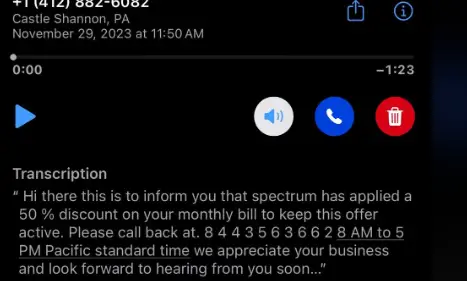Have you received a suspicious text saying you Spectrum is giving you 50% discount on your monthly bill and asking you to call a number 8443563662 to activate it? So many people have complained of receiving these texts. This post would explain in details everything you need to know about these Spectrum 50% Discount Scam and what to do to protect yourself.
What Is The Spectrum 50% Discount Scam?

The Spectrum 50% Discount Scam is a fraudulent text where scammers pretend to be representatives of Spectrum. They claim that you have received 50% discount on your monthly bills and ask you to call a number included in the text.
Here are some characteristics of this Spectrum 50% Discount Scam
The Spectrum 50% Discount Scam has several distinct characteristics that can help identify it as a scam:
- The scam typically begins with an unsolicited phone call, email, or text message from someone claiming to be a representative of Spectrum.
- The scammer offers an attractive deal, such as a 50% discount on your Spectrum bill, which may seem too good to pass up.
- To “verify” your account or to apply the discount, the scammer may ask for sensitive personal information, such as your account number, Social Security number, or payment details.
- Scammers may use caller ID spoofing to make it appear as though the call is coming from Spectrum’s official phone number.
How to Protect Yourself From Scams Like The Spectrum 50% Discount Scam
- Verify the source of the text.
- Treat unsolicited offers, especially those that seem too good to be true, with skepticism.
- Look out for poor grammar, spelling mistakes, generic greetings, or unprofessional communication.
- Never share sensitive personal information, such as Social Security numbers, bank account details, or passwords, over the phone or online unless you are certain of the recipient’s identity and legitimacy.
- Use a strong password
Avoiding phishing scams requires vigilance and awareness. Here are some effective ways to protect yourself from phishing attacks:
Tips to Avoid Phishing Scams:
- Be Skeptical of Unexpected Communications:
- Be cautious with unsolicited emails, texts, or calls, especially those asking for personal or financial information.
- Verify the Source:
- Always verify the sender’s email address or phone number. Scammers often use addresses or numbers that look similar to legitimate ones.
- Look for Red Flags:
- Check for spelling and grammatical errors, generic greetings (e.g., “Dear Customer”), and urgent or threatening language.
- Don’t Click on Suspicious Links:
- Hover over links to see the actual URL before clicking. If it looks suspicious or doesn’t match the purported sender, don’t click it.
- Check the Website’s Security:
- When entering personal information online, ensure the website is secure. Look for “https://” in the URL and a padlock icon in the browser’s address bar.
- Avoid Downloading Attachments:
- Don’t open email attachments from unknown or suspicious sources. These could contain malware.
- Use Multi-Factor Authentication (MFA):
- Enable factor Authentication on your accounts so as to add an extra layer of security. This makes it harder for scammers to gain access even if they have your password.
- Report Phishing Attempts:
- Report suspicious emails to your email provider and the organization being impersonated. In the U.S., you can forward phishing emails to the Anti-Phishing Working Group at reportphishing@apwg.org and to the FTC at spam@uce.gov.
What Do You Do When You Suspect A Phishing Attempt
In this digital age and time, almost everyone has at one time received a phishing text or email and often times they fall victim and get scammed. This is why it is imperative that you are always careful when you receive any text or email because one careless click on a link can cause a whole lot of problems for you. Now if you suspect a phishing attempt, here is what I advise you do:
- Do Not Respond to the text, because you responding is actually giving access to the scammers, simply delete it when you receive.
- Quickly change your password if you have mistakenly clicked on the link or given away your login details. Change your password to a strong and unique password.
- Keep an eye on your accounts for any unauthorized transactions.
- Also scan you devices for any malware.
By following these tips, you can significantly reduce your risk of falling victim to phishing scams and keep your personal and financial information safe. You can also join online forums to discuss these types of scams, like this Reddit threat where other people who have received this suspicious calls are talking about it.
Conclusion
This internet age came with so many advantages and also disadvantages. Phishing is an example of one of such. Internet users should always apply caution and be wary. Scammers often use scare tactics or urgency to manipulate individuals into taking quick actions. It’s essential to stay vigilant and take precautions to protect yourself.